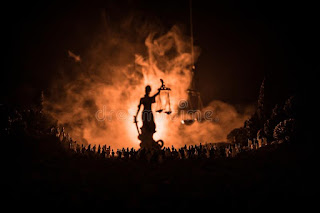There I was, sitting in a large room, listening to a progressive bible scholar talk about their discomfort with the term "creation care." You know, the idea that creation is this fragile, delicate thing, and that it requires us to carefully tend and nurture it. It's a little baby bunny that we nurse back to health, or the delicate wings of a butterfly, or that first fragile shoot of a tomato seedling. As a modestly competent amateur gardener, I know what it is to care for delicate living things.
I also know that the creation is so very much more than the small patch of land which I "own."
The bible scholar then suggested that, in the face of the climate crisis, the term had served its purpose. Its time had passed, and I most certainly agreed. In fact, I wrote a whole book on that exact subject.
Instead, the scholar posited, we should be calling efforts around faith and the environment "climate justice."
To which I heaved a sigh, and not because slapping the word "justice" onto every single concept feels the teensiest bit prog-buzzword-lazy.
Applying a "justice framework" to the climate crisis means some very specific things. It means framing climate action through the lenses of race and gender. It means conceptualizing it in terms of systemic equity. It means talking about the disproportionate impact of our changed world on Black and Brown bodies. It means decolonizing and dismantling and reimagining will be earnestly discussed, and, again, oy gevalt.
Not because dealing those things is wrong, per se, but because, as a semiotic toolset, they fundamentally misrepresent the crisis we're encountering. Those terms are part of academic and activist justice discourse, as human social systems are endlessly deconstructed, challenged, and critiqued.
If we want to talk about "justice," though, we need to understand the term with clarity. Justice is how a society manages competing interests, how a particular social system balances out the claims of individuals and groups within it. Justice rests on the application of power, on "might for right." It's the scales and the sword. If it's limited to the human sphere, that is, which it now very much is not.
The climate crisis is no longer a crisis within a system of government, or within the informal systems of human culture. It's an existential crisis, one that has moved beyond the constructs of our society. It is now, first and foremost, an imbalance in the natural order of our little world. More significantly, it is past the tipping point. It has become, due to our hubris, a self perpetuating process, a cascade, one beyond our control.
Fools that we humans are, we have chosen to offend creation itself. We have thrown our whole planetary system off kilter, and that means that the "person" offended in this instance isn't one group of human beings or another. It's not human at all.
It is no longer a matter of "social justice," because it's bigger than us. We have offended the skies. We have offended the seas. We have offended the soil. All of creation demands a verdict.
Which means, quite frankly, that "climate justice" is not the sort of thing that we human beings should be so eager to encounter.
When God sets things aright, and begins a return to balance, what does that look like? When the imaginary worlds of our social constructs and synthetic economies are forced to stand before the Truth, what does that look like?
God help us, we know what that looks like. It looks like what we're seeing now. Unprecedented fires. The howling of winds. Towns, shattered into matchsticks. Floods, drowning us in our homes. It looks like nothing homo sapiens sapiens has ever experienced in the 175,000 years our species has walked this little world. It looks like the fateful lightning of his terrible swift sword.
Calling for "climate justice" reminds me of the words of the prophet Amos, who smacked down those among him who were eager for God to set things aright. "Woe to you who long for the day of the Lord," Amos roars, and I hear his voice hard against us. We claim to want the arrival of God's justice, as the people of Israel once yearned for the Day of the Lord.
But that's because we are, as they were, fools. Climate justice? Lord have mercy, we don't know what we're asking.








